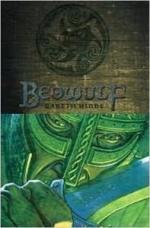Far-famous
chieftain, gory from sword-edge,
Refreshing
the face of his friend-lord and ruler,
30 Sated
with battle, unbinding his helmet.
Beowulf
answered, of his injury spake he,
His
wound that was fatal (he was fully aware
He
had lived his allotted life-days enjoying
The
pleasures of earth; then past was entirely
35 His measure
of days, death very near):
{Beowulf regrets that he has no son.}
“My
son I would give now my battle-equipments,
Had
any of heirs been after me granted,
Along
of my body. This people I governed
Fifty
of winters: no king ’mong my neighbors
40 Dared
to encounter me with comrades-in-battle,
Try
me with terror. The time to me ordered
I
bided at home, mine own kept fitly,
Sought
me no snares, swore me not many
{I can rejoice in a well-spent life.}
Oaths
in injustice. Joy over all this
45 I’m
able to have, though ill with my death-wounds;
Hence
the Ruler of Earthmen need not charge me
With
the killing of kinsmen, when cometh my life out
Forth
from my body. Fare thou with haste now
{Bring me the hoard, Wiglaf, that my dying eyes may be refreshed by a sight of it.}
To
behold the hoard ’neath the hoar-grayish stone,
50 Well-loved
Wiglaf, now the worm is a-lying,
Sore-wounded
sleepeth, disseized of his treasure.
Go
thou in haste that treasures of old I,
Gold-wealth
may gaze on, together see lying
[93] The ether-bright jewels, be easier able,
55 Having
the heap of hoard-gems, to yield my
Life
and the land-folk whom long I have governed.”
[1] B. renders: He (W.) did not regard his (the dragon’s) head (since Beowulf had struck it without effect), but struck the dragon a little lower down.—One crux is to find out whose head is meant; another is to bring out the antithesis between ‘head’ and ‘hand.’
[2] ‘Þaet þaet fyr’
(2702), S. emends to ‘þa þaet fyr’ = when
the fire
began to grow less intense
afterward. This emendation relieves the
passage of a plethora of conjunctive
þaet’s.
[3] For ‘gefyldan’ (2707), S. proposes ‘gefylde.’ The passage would read: He felled the foe (life drove out strength), and they then both had destroyed him, chieftains related. This gives Beowulf the credit of having felled the dragon; then they combine to annihilate him.—For ‘ellen’ (2707), Kl. suggests ’e(a)llne.’—The reading ’life drove out strength’ is very unsatisfactory and very peculiar. I would suggest as follows: Adopt S.’s emendation, remove H.’s parenthesis, read ‘ferh-ellen wraec,’ and translate: He felled the foe, drove out his life-strength (that is, made him hors de combat), and then they both, etc.




